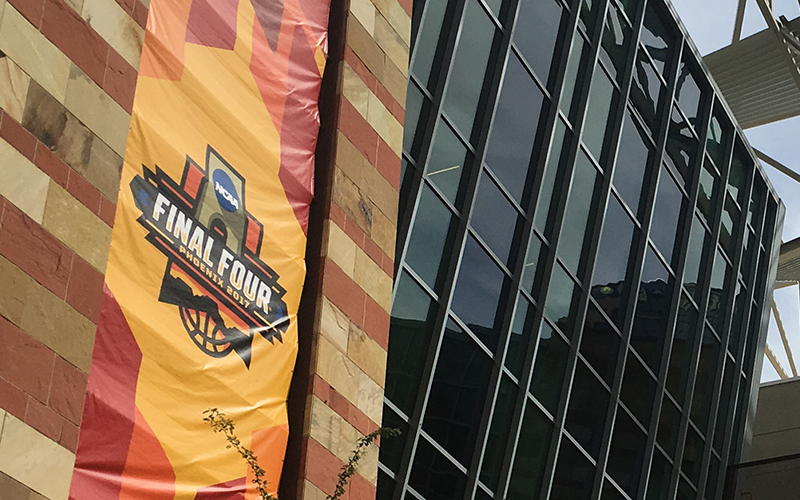PHOENIX — Even before 76,000 people in University of Phoenix Stadium were looking up at game-ending confetti on Monday night at the NCAA men’s basketball championship game, Phoenix Mayor Greg Stanton was already looking ahead.
Championship sports today, presidential politics tomorrow?
“There is no doubt in my mind that our community will be the host of either the Democratic political convention or the Republican political convention over the next few years,” Stanton told Cronkite News on Monday afternoon. “We’ve shown that we can host massive crowds, we can do logistics and we can do safety as well, if not better, than anyone.”
No matter how feasible Stanton’s convention hopes are, his comment shows that Phoenix is hardly fatigued from hosting the Super Bowl, College Football Playoff National Championship Game and Final Four in three straight years.
North Carolina’s basketball team was the latest of the three champions to be crowned in Glendale as the Valley has become a mecca for major sporting events.
“You can’t just host (these events), you have to host them well, and that’s exactly what we do here in Phoenix,” said Stanton, the mayor for all three of these sporting spectacles. “Talk to the NFL, talk to the College Football Championship, talk to the folks at the NCAA. They will tell you that there is no better prepared, hungrier city to host these events than the city of Phoenix and the surrounding communities.”
The same model has prevailed for each of the three big events: hold competition in the domed stadium in Glendale and the fan festivities in downtown Phoenix.
The Final Four followed this “science,” as Stanton called it. Phoenix played host to a three-day March Madness music festival at Margaret T. Hance Park and a Fan Fest at the Phoenix Convention Center.
Before this trio of championships, University of Phoenix Stadium had hosted Super Bowl XLII, an NCAA men’s basketball regional, Fiesta Bowls and two BCS National Championship games. Ron English, director of the NCAA men’s basketball championships, said Phoenix’s experience hosting major events played a role in the selection committee’s decision to bring the Final Four to the Valley.

A Final Four banner hangs from the Phoenix Convention Center in downtown Phoenix on Tuesday, April 4, 2017. (Cronkite News photo)
“Just working those big events gives them a little more experience in putting on an event like the Final Four,” English said. “We do go to other cities where those big events are taking place. From an experience standpoint, to be able to know what to do to put on these major events, yes that does make a little bit of a difference.”
Stanton said that if Phoenix is to land another major event, it will need to continue its run of “regional partnership” with its surrounding communities. While Glendale has hosted the games, and Phoenix has been the epicenter of fan festivities, Tempe and Scottsdale have also played key roles with fan and charity events.
Dawn Rogers, president/CEO of the Phoenix Local Organizing Committee (PLOC), said the support she received from communities around the Valley helped all of the weekend’s events go as smoothly as possible.
“Because we had an entire community pulling in the same direction, it was easy to make phone calls and deal with any issues that popped up in the months leading up to (the Final Four) and especially this week,” Rogers said. “It’s great to have that support from everybody across the Valley.”
As is commonly the main factor in hosting major events such as these, money will most likely dictate Phoenix’s next endeavor. Local investment in this year’s Final Four was in the range of $15 million to $20 million, according to a spokesperson for the PLOC. The 2014 Final Four cost the city of Dallas $10.7 million in state and local tax money, according to public records research conducted by the Indianapolis Star. The Star also reported that for the 2020 Final Four in Atlanta, $8.5 million of taxpayer money is expected to be used.
“It’s not inexpensive, you’ve got to be able to marshal the resources to be willing to host events like this,” he said. “And it raises a lot of money, there’s no doubt about it.”
Super Bowl XLIX brought in an estimated $719 million to the greater Phoenix area, according to a report from the W.P. Carey School of Business at Arizona State University. The 2016 College Football Playoff generated nearly $274 million, according to a similar study by the school.
While the financial impact of this year’s Final Four is still unknown, tangible benefits from the event are already evident. This includes a $300,000 refurbishment of the court at Harmon Park as part of the NCAA Legacy Project. The PLOC estimates 18,000 children will use the court each year.
For the moment, Phoenix’s mega-event dance card is clear. Final Four and Super Bowl locations are set through 2021, while College Football Playoff National Championship venues are set through 2020. That leaves the Valley without a championship sports contest for at least the next four years.
“I think we have a phenomenal chance to host these events again,” Rogers said. “I hope that we have all of these events back, the fans certainly enjoy coming to the state of Arizona. We have a world-class facility. We have the volunteers and the mentality to host events like this. We are the world’s friendliest airport. All of those things mix together to make it a really positive experience.”
(Video by Tyler Paley/Cronkite News)